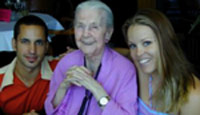I was listening to an interview on CBC’s wonderful Sunday program called "Our World”. They were speaking with Charles Taylor, a 76-year-old Canadian philosopher and political activist who was recently awarded the Templeton Prize to research how spiritual aspirations shape society and politics. In this interview, he came across as one of the most optimistic commentators on the state of the world I’ve heard and he was positive without being unrealistic or naïve.
The essence of his message was that, while the world has some serious troubles, they are not insurmountable if we can build communication bridges between the various fractious communities around the globe. While I can’t begin to do his analysis justice here, he sees many of the problems and conflicts as a function of how human beings acquire ‘meaning’ and then coordinate their actions within whatever context that meaning provides. For example, he suggests the radical elements in Islam (as well as radical elements in many parts of the world) are engaged in creating meaning for their constituents that enables and empowers their worldview and agenda—something like ideological entrepreneurs creating a political enterprise that gives people identity and purpose.
Mr. Taylor said he doesn’t think there are conflicts between civilizations so much as there are small numbers of fundamentalist elements in both camps that have adopted the destruction of a specific civilization as a project. It is incumbent on us to stop the project if we are to preserve civilization.
My core understanding of how the world works is that we always give power to whatever we resist. This doesn’t mean that violence and resistance aren’t sometimes necessary. It just means they are never justified and, at best, will provide only temporary solutions to whatever problem they are trying to address. They never resolve the underlying conditions that gave rise to the problems in the first place.
True resolution to these kinds of intractable or paradigmatic patterns can only come about when visionary people create a ‘new project’ that has more possibility and power for everyone involved. When a critical mass of committed people commit to and participate in that project, we reach the tipping point and then the ‘new’ worldview will displace (and eventually replace) the old.
What intrigued me was Mr. Taylor’s emphasis on the critical role of community in building bridges. This loss of community (which includes the disintegration of traditional linkages between generations) contributes to much of today’s malaise. For me, he offered yet another possible role for Baby Boomers as they grow older—that of leaders responsible for building bridges between the generations and communities across the cultural and ethnic divides in our belief systems. I am calling this kind of role ‘Eldering’. It is what leadership looks like when we reach that point in our lives where our agenda is primarily on behalf of others and where our intention shifts to taking care of a future that we won’t necessarily be around to see. Eldering is wisdom in action. At every age.

